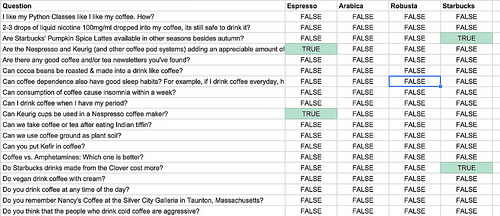Blogging isn’t going out of style any time soon; with the ascent of content marketing, blogging, podcasting and video are on the minds of marketers and PR professionals all the time. In this 10-part Beginner’s Guide to Blogging series, we’re going to explore what makes a blog great and give you some structures and frameworks to help make blogging easier. Take from it what works and leave behind what doesn’t work!
Bulk Blog Topic Generation
As we close out the Beginner’s Guide to Blogging, we finish by answering what’s arguably the most frequent question in blogging and content creation:
What should we write about?
An incredible amount of digital ink has been spilled over the years on what to write about. However, most of the advice has focused on how to develop individual blog topics, such as “follow this blog title format”. These individual tactics, while useful, do not scale a successful content marketing program, do not fill an editorial calendar.
Instead of generating blog topics on a one-off basis, what if you could create several hundred at a time? Having a huge crop of topics would then allow you to create themes and weave narratives of multiple posts together. You could group and cluster topics together that beget larger, long-form content as well.
Questions and Answers
Sites such as Quora, Ask.com, and many others allow users to pose questions to the broader community on nearly any imaginable topic. Let’s return to our fictional coffee shop, Todd and Jim’s Coffee Emporium. Suppose we wanted to blog about coffee, but were unsure what to write about? Look at the Quora page on coffee:

Using a professional-grade text editor, copy and paste all of the questions – especially the unanswered ones – to a spreadsheet and begin designing an editorial calendar. Don’t copy the answers, just the questions, so that you can provide your own unique perspective on questions you know your community is asking. Look at how questions cluster together by the inquiry words such as how, when, does, why, etc.:

This alone could give you quite an editorial calendar, but there’s more!
Social Monitoring
As Edison Research VP of Strategy Tom Webster often says, social media isn’t great for quantitative research owing to its many biases, but it is excellent for qualitative research. You can get a sense of the way people ask questions about your given topic, then compile those questions into your editorial calendar as content marketing topics. For example, here are two tweets on the topic of coffee:

We can extract hundreds, perhaps thousands more tweets that are questions about coffee and supplement the questions from Q&A sites to build a robust list of questions and topics.
Conference Agendae
Conferences aren’t just great places to learn and network. The agenda from any given industry conference is also a blueprint, a roadmap of the hottest topics in that industry. A session typically doesn’t make it onto a conference agenda unless conference organizers are sure it is of interest to attendees. Here’s a sample of the agenda from the CoffeeFest conference:

Above, we see plenty of topics we can use as starting points for not just individual blog posts, but themes to organize our previous lists of individual questions by.
Organizing Topics
Once you’ve got a very long list of questions and potential topic categories, use the spreadsheet software of your choice to quantify and organize your topics. Suppose, based on the lists we’ve extracted, you wanted to classify by coffee bean type, or by coffee roast type? With your spreadsheet, use functions like regexmatch or countif to determine whether the question contains your keywords by topic grouping:

Above, we see several questions containing the word Starbucks, as well as the other types of roasts. From here, we could organize a blog series on competitive terms, a series on roasts, and a series on bean types, generating several months’ worth of blog posts.
Conclusion
We’ve reached the end of our blogging for beginners journey. We’ve covered the basics of blogging, 8 content structures, and how to generate blog topics at scale. With this series, you should now be well equipped to begin your content marketing journey and do it better than your competitors (unless they read our blog, too). Go forth and create great content!
Digital & Social Articles on Business 2 Community(78)
Report Post







